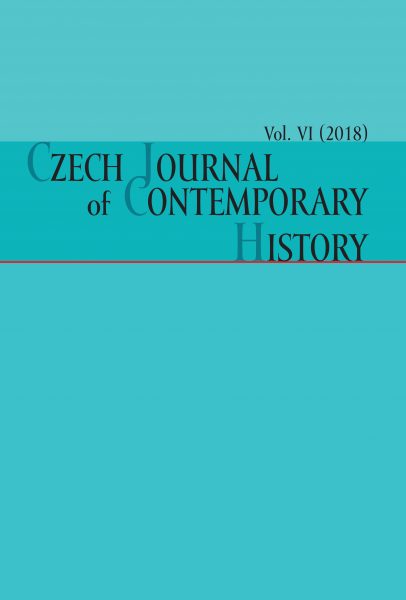Prague Chronicle
Prague Chronicle
Author(s): Oldřich Tůma, Tomáš HermannSubject(s): Scientific Life
Published by: AV ČR - Akademie věd České republiky - Ústav pro soudobé dějiny
Keywords: scientific life;
Summary/Abstract: This paper contains two contributions: 1. Unreached 90th Birthday of Milan Otáhal Milan Otáhal (1928–2017) was a leading historian studying the contemporary history of Czechoslovakia. In the 1960s, he was the head of the Department of Modern History of the Historical Institute of the Czechoslovak Academy of Sciences; in the early 1970s, he lost his job at the institute and was expelled from the Communist Party of Czechoslovakia. He was one of the fi rst signatories of Charter 77 and was active in the historical samizdat as an independent historian. Since the 1990s, his scientifi c activity was connected with the newly established Institute for Contemporary History. His main focus was the history of the anti-regime opposition and of the society between 1969 and 1989, and the role of students and intelligentsia in the change of the political situation in the end of the 1980s. He wrote a number of factographically rich and interpretationally distinctive publications on these topics. The author of the obituary mentions principal contributions of Milan Otáhal to the knowledge and understanding of Czechoslovakiaʼs most recent history, emphasizing that he was a historian who was not only intellectually refl ecting the period he was living in, but who was also intensively experiencing and co-creating it. 2. Central European Historian Bedřich Loewenstein (1929–2017) The author summarizes the life and in particular scientifi c career of historian Bedřich Loewenstein, describes areas of his professional interest and his intellectual orientation, reminds of his most important works published in Czech and German, and assesses his contribution. Loewenstein was born in 1929 in Prague, in a Czech- -German-Jewish family, lived through the German occupation in diffi cult conditions, and started studying history and philosophy at what was then the Faculty of Arts and History of the Charles University, but was expelled two years later for political reasons. He was allowed to complete his studies later, and in 1957 started working at the Institute of History of the Czechoslovak Academy of Sciences, where he remained until his dismissal in 1970. He started intensive contacts with West German historians and other intellectuals during the 1960s, and organized an important international symposium, “Europe and Fascism”, in Prague in 1969. Since the early 1970s, he was not allowed to publish and was employed as an interpreter/translator of the trade mission (since 1973 embassy) of the Federal Republic of Germany. Although watched by the State Security, he managed to make use of his position to establish an important connection between domestic dissenters and their supporters abroad, which was used to exchange publications and other documents. In 1979, he accepted an offer of professorship of recent history at the Free University in West Berlin, where he remained until 1994 and where he could develop and expand his research interests and devote himself to intensive publication activities. For a long time, Bedřich Loewenstein was focusing on the German history of the 19th and 20th centuries; since the 1960s, he was also studying ideological, psychological, and social prerequisites of Nazism and later also more general issues of crises of the 20th century, modernism and modernity, civic society, European nationalism, and civilization. In this respect, he was able to integrate approaches and knowledge of other social sciences – sociology, social psychology, anthropology, philosophy, political science, and economy – in a prolifi c manner. He was a long-time and intensive intermediary of views and ideas between the Czech (or Czechoslovak) and German historiographies. His works, written in a concise, scientifi c-essayist style, earned him respect among colleagues both at home and abroad. His principal works include Plädoyer für die Zivilisation (Hamburg, Hoffmann und Campe 1973), Entwurf der Moderne: Vom Geist der bürgerlichen Gesellschaft und Zivilisation (Essen, Reimar Hobbing 1987; in Czech in 1995), Problemfelder der Moderne: Elemente der politischen Kultur (Darmstadt, Wissenschaftliche Buchgesellschaft 1990), My a ti druzí: Dějiny, psychologie, antropologie [We and the others: History, psychology, anthropology] (Brno, Doplněk 1997; in German in 2003). A synthesis of Loewensteinʼs thinking about a broad spectrum of issues is presented in his book Der Fortschrittsglaube: Geschichte einer europäischen Idee (Göttingen, Vandenhoeck & Ruprecht 2008; in Czech: Víra v pokrok: Dějiny jedné evropské ideje [Faith in progress: The history of a European idea]. Praha, OIKOYMENH 2009).
Journal: Czech Journal of Contemporary History
- Issue Year: VI/2018
- Issue No: 6
- Page Range: 159-175
- Page Count: 17
- Language: English

